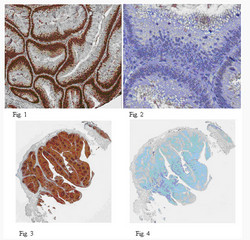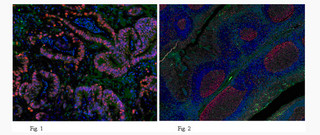PCNA Mouse Monoclonal Antibody [Clone ID: PC10]
CAT#: AM10035PU-S
PCNA mouse monoclonal antibody, clone PC10, Purified
Size: 1 ml
Need it in bulk or conjugated?
Get a free quote
CNY 4,001.00
货期*
5周
规格
Specifications
| Product Data | |
| Clone Name | PC10 |
| Applications | IF, IHC, WB |
| Recommend Dilution | Immunohistochemistry and Immunocytochemistry Frozen or Formalin-Fixed Paraffin-Embedded (FFPE) tissue sections and cell smears). For IHC dilute conc. antibody at 1/50-1/200, use streptavidin~biotin system or polymer system, incubate 30 minutes at room temperature. FFPE tissue section requires antigen retriever (boiling tissue in 10 mM citrate, pH 6.0 for 20 mins, followed by cooling at RT for 20 mins). Recommended Positive Control: Human tonsil, lymph node. Western Blot: 1/100-1/400. |
| Reactivity | Human, Insect, Mouse, Rat, Yeast |
| Host | Mouse |
| Clonality | Monoclonal |
| Immunogen | Recombinant Rat PCNA protein. |
| Specificity | This antibody is specific for PCNA. PC10 reacts specifically with a 36kD nuclear protein of the Proliferating Cell Nuclear Antigen (PCNA). PCNA is an excellent marker of proliferative cells in routinely processed tissue sections. Cellular Localization: Nuclear. |
| Formulation | PBS, pH 7.4 State: Purified State: Liquid purified IgG fraction Stabilizer: 1% BSA Preservative: 0.05% Sodium Azide |
| Concentration | lot specific |
| Conjugation | Unconjugated |
| Storage Condition | Store undiluted at 2-8°C for one month or (in aliquots) at -20°C for longer. Avoid repeated freezing and thawing. |
| Gene Name | proliferating cell nuclear antigen |
| Database Link | |
| Background | Proliferating Cell Nuclear Antigen, commonly known as PCNA, is a protein that acts as a processivity factor for DNA polymerase delta in eukaryotic cells. The protein encoded by this gene is found in the nucleus and is a cofactor of DNA polymerase delta. The encoded protein acts as a homotrimer and helps increase the processivity of leading strand synthesis during DNA replication. In response to DNA damage, this protein is ubiquitinated and is involved in the RAD6-dependent DNA repair pathway. Two transcript variants encoding the same protein have been found for this gene. Pseudogenes of this gene have been described on chromosome 4 and on the X chromosome. PCNA was originally identified as an antigen that is expressed in the nuclei of cells during the DNA synthesis phase of the cell cycle It is increased during late G1 phase and S phase of the cell cycle and declines during G2 and M phases. |
| Synonyms | Cyclin |
| Reference Data | |
Documents
| Product Manuals |
| FAQs |
| SDS |
Resources
| 抗体相关资料 |
Customer
Reviews
Loading...


 United States
United States
 Germany
Germany
 Japan
Japan
 United Kingdom
United Kingdom
 China
China



